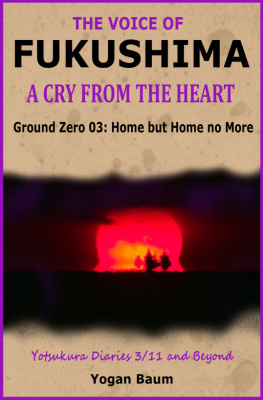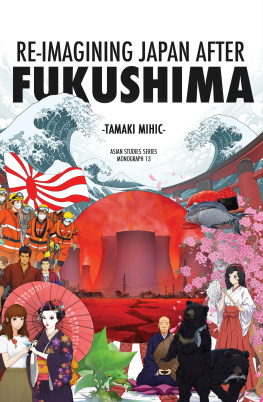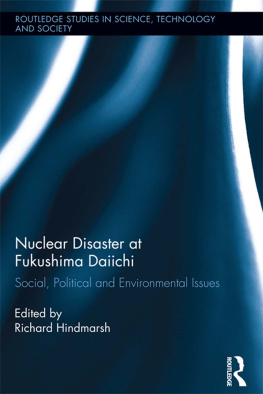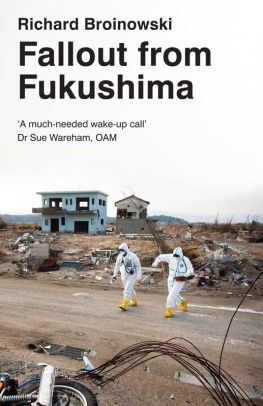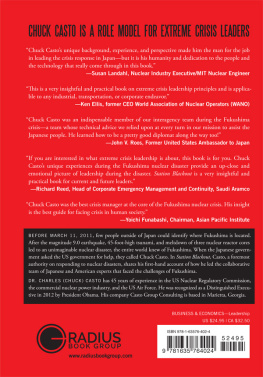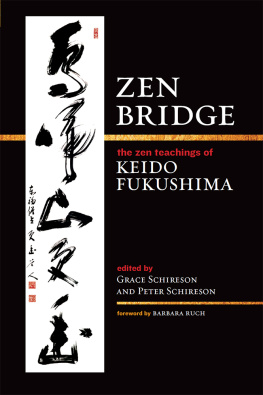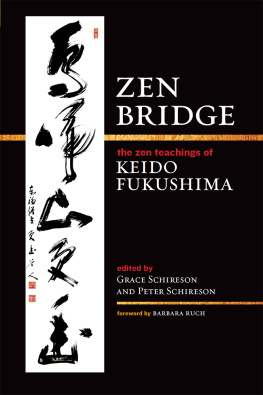
Fall-out from Fukushima
This book shows how the Fukushima plaintiffs have challenged narratives of safety and risk containment produced by TEPCO and the Japanese government through offering new empirical data on risk perceptions and life choices of some nuclear evacuees.
Considering the Fukushima evacuees disappearance from public discourse in Japan, the book engages with theoretical writings on risk, neoliberal governmentality and citizen science. Chapters draw on a wide range of anthropologically-related methodologies including socio-linguistics, participant observation, and qualitative interviews. Themes of self-governance, resistance, gender, kinship, class and social change surface throughout, setting the Fukushima experience in a broad historical, social, and comparative context. This is the first ethnographic account of the Fukushima litigation and the first extensive qualitative study documenting the worldviews and living conditions of nuclear evacuees who moved outside Fukushima Prefecture, with a particular focus on underrepresented groups (single mothers, elderly and disabled evacuees). The history of industrial disasters and the role of citizens in shaping environmental policy in Japan is also evaluated.
Fall-out from Fukushima sets out to be a manifesto for understanding and supporting post-nuclear disaster societies, and will appeal to students and scholars of social, legal, and linguistic anthropology, science and technology studies, as well as Japanese studies.
Giulia De Togni is a research fellow at the University of Edinburgh. Her research focuses on risk, technology, and health. She received her MSc in social anthropology from Oxford University (2015) and a PhD in social anthropology from UCL (2019) with dissertations focused on Fukushima.
Nissan Institute/Routledge Japanese Studies
Series Editors:
Roger Goodman, Nissan Professor of Modern Japanese Studies, University of Oxford, Fellow, St Antonys College
J.A.A. Stockwin, formerly Nissan Professor of Modern Japanese Studies and former Director of the Nissan Institute of Japanese Studies, University of Oxford, Emeritus Fellow, St Antonys College
Japans New Ruralities
Coping with Decline in the Periphery
Edited by Wolfram Manzenreiter, Ralph Ltzeler and Sebastian Polak-Rottmann
New Directions in Japans Security
Non-U.S. Centric Evolution
Edited by Paul Midford and Wilhelm Vosse
Child Guidance Centres in Japan
Alternative Care and the Family
Michael Rivera King
Gradual Institutional Change in Japan
Kantei Leadership under the Abe Administration
Karol Zakowski
Tenk: Cultures of Political Conversion in Transwar Japan
Irena Hayter, George T. Sipos, Mark Williams
Rethinking Locality in Japan
Edited by Sonja Ganseforth and Hanno Jentzsch
Dwa Policy and Japanese Politics
Ian Neary
Fall-out from Fukushima
Giulia De Togni
For more information about this series, please visit: www.routledge.com/Nissan-Institute-Routledge-Japanese-Studies/book-series/SE0022
First published 2022
by Routledge
2 Park Square, Milton Park, Abingdon, Oxon OX14 4RN
and by Routledge
605 Third Avenue, New York, NY 10158
Routledge is an imprint of the Taylor & Francis Group, an informa business
2022 Giulia De Togni
The right of Giulia De Togni to be identified as author of this work has been asserted by her in accordance with sections 77 and 78 of the Copyright, Designs and Patents Act 1988.
All rights reserved. No part of this book may be reprinted or reproduced or utilised in any form or by any electronic, mechanical, or other means, now known or hereafter invented, including photocopying and recording, or in any information storage or retrieval system, without permission in writing from the publishers.
Trademark notice: Product or corporate names may be trademarks or registered trademarks, and are used only for identification and explanation without intent to infringe.
British Library Cataloguing-in-Publication Data
A catalogue record for this book is available from the British Library
Library of Congress Cataloging-in-Publication Data
Names: De Togni, Giulia, 1989- author.
Title: Fall-out from Fukushima : nuclear evacuees seeking compensation and legal protection after the triple meltdown / Giulia de Togni.
Description: Abingdon, Oxon ; New York, NY : Routledge, 2022. | Includes bibliographical references and index. |
Identifiers: LCCN 2021030223 | ISBN 9781032033006 (hbk) | ISBN 9781032033044 (pbk) | ISBN 9781000480245 (adobe pdf) | ISBN 9781000480283 (epub) | ISBN 978100316700 (ebk)
Subjects: LCSH: Fukushima Nuclear Disaster, Japan, 2011--Social aspects. | Fukushima Nuclear Disaster, Japan, 2011--Political aspects. | Disaster victims--Japan--Fukushima-ken. | Japan--Social conditions--21st century.
Classification: LCC HV623 2011 .F85 D425 2022 | DDC 363.17/990952117--dc23
LC record available at https://lccn.loc.gov/2021030223
ISBN: 978-1-032-03300-6 (hbk)
ISBN: 978-1-032-03304-4 (pbk)
ISBN: 978-1-003-18670-0 (ebk)
DOI: 10.4324/9781003186700
Several people and institutions made possible the research on which this study is based. I am particularly indebted to the Arts and Humanities Research Councils (AHRC) scheme London Arts and Humanities Partnership (LAHP), which has covered all research expenses for my doctoral project. LAHP funded my fieldwork in Japan, and provided me with additional funding to attend international conferences where I presented my research. These included: the conference 3.11 Fukushima Six Years On which I co-organised and chaired at the University of Kyoto in March 2017; the annual meeting of the Association of Social Anthropologists of the UK and Commonwealth (ASA) held at the University of Oxford in September 2018; the annual meeting of the American Anthropological Association (AAA) held in San Jose California in November 2018; the JAWS (Japan Anthropology Workshop) conference held at the University of Aarhus in Denmark in April 2019; and the international symposium Understanding Health, Risk and Disaster: Social Scientific and Critical Public Health Contributions held at the University of Edinburgh in December 2019.
Presenting my research at these international events greatly benefited my project, as I could receive extensive feedback on my study, and exchange ideas with my peers and senior figures in the fields of social, legal and linguistic anthropology, Japanese studies, and STS. In particular, I would like to thank for their valuable suggestions and insights: Brigitte Steger, Joy Hendry, Mitchell W. Sedgwick, Nicholas Sternsdorff-Cisterna, Ofra Goldstein-Gidoni, Chika Watanabe, Yoko Demelius, Andrew Littlejohn, Justin B. Richland, Abeysinghe Sudeepa, Yuki Sonoda, Shunji Matsuoka, Mika Yamada, Akihiko Ozaki, Toyoaki Sawano, Masaharu Tsubokura, Claire Leppold, and Adam Kendon.
I am very grateful to my mentor at University College London Anthropology Department, Alexandra Pillen, who thoughtfully supervised the work that led to this manuscript. Alexs guidance as a mentor has been exemplar, and her invaluable feedback and warm encouragement have considerably facilitated both my research and the writing of this study at various stages. I have greatly benefited from taking part in Alexs module Linguistic Anthropology at UCL, first as a student in 20152016 and then as a teaching assistant in 20172019. Furthermore, Alex introduced me to the seminar series on Anthropology and Language held at the Royal Anthropological Institute of Great Britain and Ireland (RAI). This led to valuable contacts with senior colleagues who informed my linguistic analysis of the Fukushima evacuees narratives. These included: David Parkin, Stephen Pax Leonard, Elisabeth Hsu, Fiona Jordan, and David Zeitlyn. I later joined the RAI as an affiliated scholar and I benefited from attending a number of its conferences and public engagement events, including the 2020 RAI Being Human podcast series for which I contributed as an invited discussant for the episode Dealing with Disaster in Japan.


